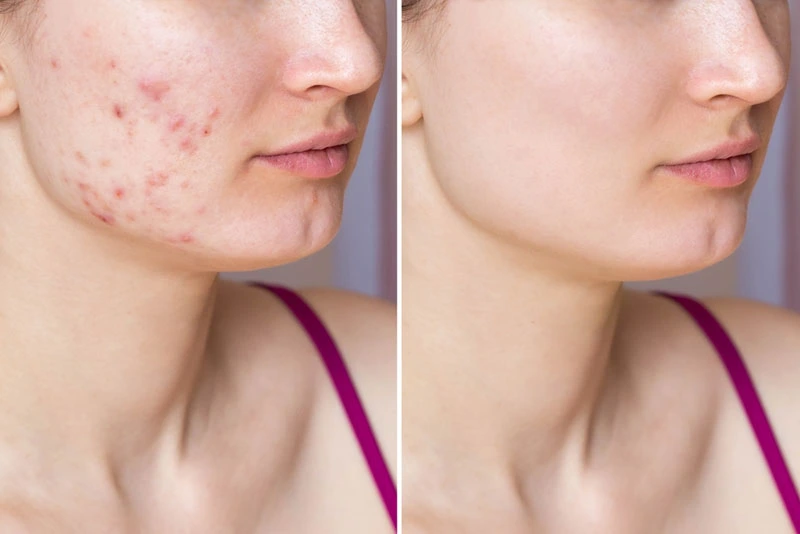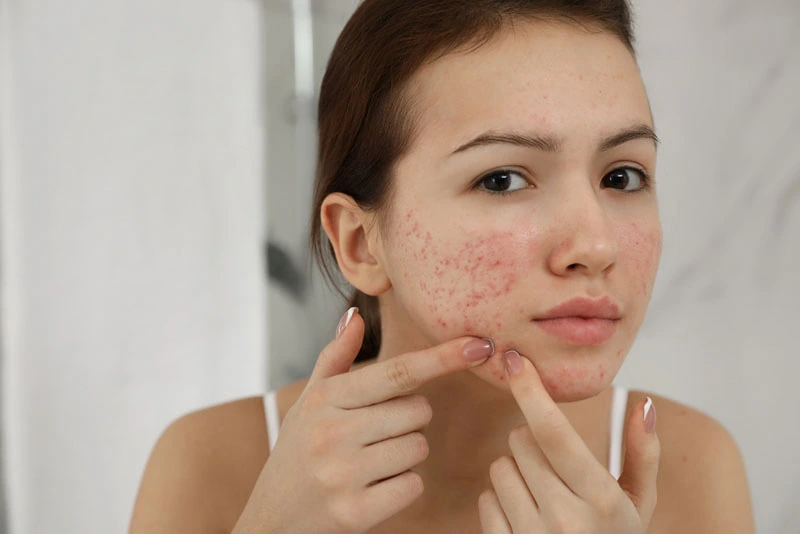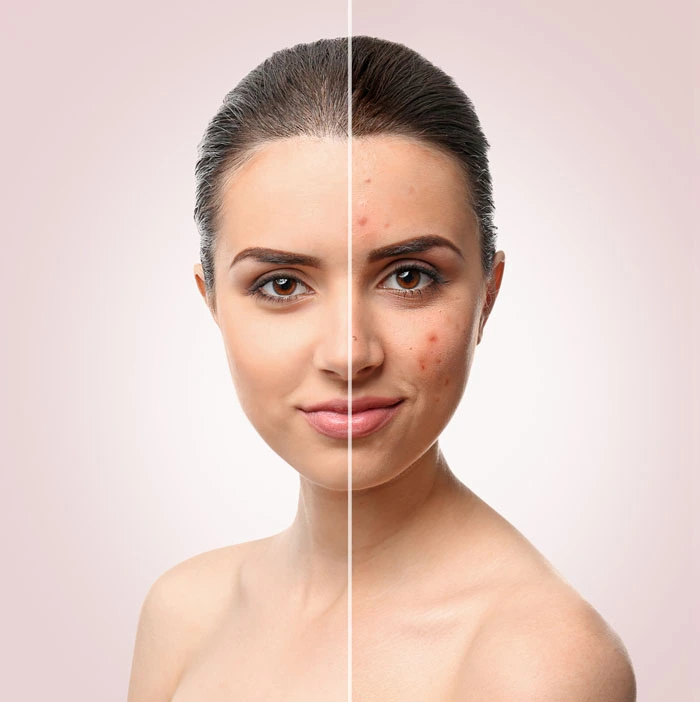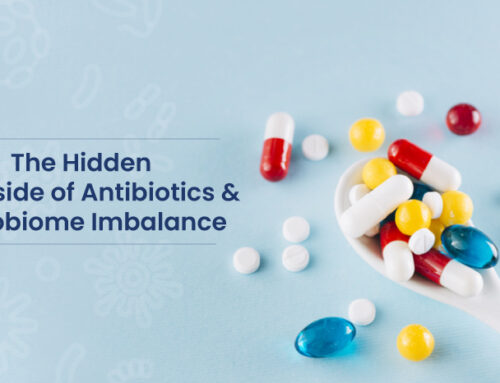Imagine walking into a room full of people and feeling utterly confident; your head held high, unbothered by the common menace that used to hold you back – acne. Sounds incredible? Indeed, it is achievable! We have often been told that acne would go away independently, but looking in the mirror each morning tells us a different story. Fortunately, an innovative solution has risen to the forefront: probiotics. Regarded by many as an unexpected hero, science shows probiotics could hold the key to finally saying goodbye to acne permanently. We are no longer discussing temporary solutions or band-aid remedies; we’re talking about a robust ally in our skincare regimen that empowers our skin to bounce back stronger than ever. Ready to embrace a future where ‘bad skin’ days are a thing of the past? Dive right into our guide on using probiotics for effective and enduring freedom from acne.
Acne is a common skin condition when hair follicles become clogged with oil and dead skin cells, developing pimples, blackheads, and whiteheads. It can occur at any age but is most common during puberty due to hormone fluctuations. While there is no cure for acne, it can be effectively managed with various treatments, including topical creams, oral medications, and lifestyle changes. It’s important to talk to a dermatologist for personalized treatment recommendations based on your specific type of acne.
Unraveling the Causes of Acne
Acne is a skin condition that affects millions of people around the world. Several factors, including genetics, hormones, and lifestyle choices, can cause it. Understanding the causes of acne is essential to finding effective treatments for it.
Genetics plays a significant role in acne development. If your parents or siblings have had acne, you are more likely to develop it too. This is because certain genes control the amount of oil your sebaceous glands produce, which can lead to clogged pores and inflammation.
Hormones can also contribute to acne development. During puberty, hormonal changes cause an increase in sebum production. This oily substance can clog pores and lead to breakouts. Hormonal fluctuations during pregnancy and menstrual cycles can also cause acne flare-ups.
Contrary to popular belief, diet, and hygiene are not direct causes of acne. While a healthy diet and clean skin are important for overall health, they do not directly cause or cure acne.
Think of your skin as a garden – if you don’t properly maintain it and remove any weeds (dead skin cells), it will become overrun with unwanted growth (bacteria) that can cause acne.
Understanding the causes of acne is important for finding effective treatment options. Now, let’s dive into one specific reason: hormones.
Understanding Hormones and Acne in Teens
As mentioned earlier, hormonal changes during puberty can cause an increase in sebum production and lead to acne development. However, there are several other ways hormones can impact acne in teens.
Androgens are hormones that increase during puberty in both boys and girls. These hormones stimulate the sebaceous glands to produce more oil, which can clog pores and lead to acne.
In girls, hormonal fluctuations during menstrual cycles can also cause acne flare-ups. A week before menstruation, progesterone levels rise, causing an increase in sebum production. This can lead to breakouts that often clear up after the cycle ends.
While hormonal changes are significant in acne development, they are not the only factor. Genetics and lifestyle choices can also contribute to acne in teens.

Hormonal changes during puberty are like a rollercoaster ride – sometimes it goes smoothly, and other times there are bumps (acne).
Now that we’ve explored hormones’ impact on acne development, let’s move on to treatment options for managing this skin condition.
Medical and Topical Treatments for Acne
Dealing with acne can be frustrating, especially if you’ve tried various treatments without success. Fortunately, medical and topical treatments are available that can help you get rid of stubborn acne once and for all. These treatments target the root cause of acne – clogged pores, inflammation, and bacteria growth. This section discuss different medical and topical treatments that can effectively eliminate your acne.
One effective way to treat moderate to severe acne is through prescription medications such as antibiotics, accutane, or hormonal therapy. Antibiotics work by reducing the number of acne-causing bacteria in your skin. At the same time, Accutane is a potent drug derived from vitamin A that works by reducing oil production, which helps prevent clogged pores.
Hormonal therapy pills or spironolactone are recommended for women with hormonal flare-ups. Although these treatments have potential side effects like dry skin, rashes, or liver problems, you do not need to worry because dermatologists closely monitor these symptoms.
Over-the-counter (OTC) products are also widely available and provide promising results in milder cases of acne. One example is benzoyl peroxide, which kills bacteria on the skin’s surface and prevents new acne breakouts from forming. Salicylic acid is another active ingredient that removes excess skin cells clogging pores and decreasing inflammation pathways that lead to pimples.
It’s important to remember that no matter what OTC product or prescriptions you use, consistency is key! Your skin needs time to adjust to a new skincare regimen before seeing improvement with about 4-6 weeks of regular use. Furthermore, it’s worth noting that there isn’t just one universal solution for every type of acne, so it’s best to consult with a doctor or dermatologist first to tailor-fit the best treatment for your acne type and severity.
Prescriptions, OTCs, and Therapies
Improvement of acne can be achieved through various methods. While medical treatments offer quick results, some prefer milder alternatives that produce incremental changes. People with mild cases of acne can benefit from over-the-counter (OTC) products and therapies available without a prescription. In this section, we’ll look at these alternative approaches to acne treatment.
Light therapy effectively treats moderate to severe cases of acne by using red or blue light sources that help improve cellular turnover and inflammation. Pulsing electromagnetic fields use currents that interact with skin tissues, improving blood flow and collagen synthesis and, promoting skin healing, decreasing acne scars. Exfoliation techniques like dermabrasion and microdermabrasion peels remove dead cells on the surface of your skin and unclog pores minimizing blackheads and whiteheads.
Some people turn to herbal remedies such as tea tree oil as a natural treatment for acne problems. Although tea tree oil has shown promising results in reducing inflammation due to its antibacterial properties, it’s worth bearing in mind that it does not work for every kind of zit; avoiding allergic reactions while trying different herbal remedies like ginger or garlic extracts which might cause skin irritation is also prudent.
Another popular external method for battling acne involves ice cubes, but many people wonder whether it is a myth or helpful. It is proven that using ice calms inflammation and helps reduce swelling around pimples resulting in less noticeable flare-ups. When you feel a spot starting to form, wrap an ice cube in a clean cloth and hold it against the affected area for several minutes, several times daily.
Lifestyle Adjustments for Acne Management
Acne is not only caused by hormones and genetics but also by various lifestyle factors such as diet and stress. Simple changes in your daily habits can positively affect acne prevention and management. Here are some effective lifestyle adjustments that you can make to reduce acne breakouts and improve overall skin health.

Diet Improvement:
While it’s unclear if certain foods cause acne, some studies suggest that high glycemic index (GI) diets may exacerbate acne symptoms. Foods with a high GI, such as white bread and sweets, increase blood sugar levels, leading to insulin spikes that can increase oil production and inflammation in the skin. To prevent this, consider cutting back on sugary or processed foods and instead eat fresh fruits, vegetables, lean protein sources, and whole grains.
Skincare Products:
The use of harsh skincare products or makeup can worsen acne symptoms. Choose non-comedogenic products that won’t clog pores or irritate the skin. Also, avoid scrubbing your face too hard or using hot water since it can dry out and irritate your skin. A gentle cleanser followed by a moisturizer is sufficient for most people.
Smoking:
Smoking has been linked to increased sebum production, decreased collagen formation, slow wound healing, and immune system suppression – all factors contributing to acne development. Quitting smoking can drastically improve skin health.
Sleep:
Studies suggest that poor sleep patterns may exacerbate acne symptoms since lack of sleep can lead to increased cortisol levels, which triggers oil production in the skin. Aim for 7-8 hours of sleep each night to help maintain healthy hormone levels.
Incorporating these simple lifestyle changes into your daily routine can help reduce your acne breakouts over time. However, managing stress is also essential to maintaining healthy skin.
Stress Reduction and Exercise
Stress, whether it’s mental or physical, can cause acne breakouts by triggering an increase in cortisol production. Here are some effective ways to manage stress and improve your skin health.
Mindfulness Techniques:
Mindfulness-based interventions such as meditation and progressive muscle relaxation can reduce stress and inflammatory markers associated with acne breakouts. Practicing mindfulness for just a few minutes each day can lead to significant reductions in acne symptoms.
Exercise:
Regular exercise can help reduce stress levels while increasing circulation, delivering nutrients to the skin, and reducing inflammation. Aim for at least 30 minutes of moderate activity most days of the week for maximum benefits.
Sun Exposure:
While some studies suggest that sunlight exposure may help decrease acne symptoms, it’s important to protect your skin from the sun’s harmful rays and avoid prolonged exposure. Overexposure to UV radiation can damage your skin, leading to premature aging or even skin cancer.
Yoga:
Yoga is an excellent way to reduce stress levels while improving overall health. Various yoga positions, like downward-facing dog or shoulder stand to promote healthy blood flow and decrease inflammation. Adding a weekly yoga class to your routine may help reduce breakouts over time.
Incorporating stress reduction activities into your routine and regular exercise may be useful in preventing acne breakouts over time. While there isn’t a definitive cure for acne, simple changes in lifestyle habits can aid in lessening acne symptoms.
Natural and Home Remedies for Acne
Acne can be treated with natural and home remedies, which are less expensive and have little to no side effects. Many people have found relief from acne symptoms using natural remedies and swear by these treatments.
One common natural remedy for acne is tea tree oil. Tea tree oil contains antibacterial properties that can help kill the bacteria that cause acne. Diluting tea tree oil in a carrier oil like coconut or jojoba oil before using it on the skin is important as direct use can cause irritation and burns. Apply the solution to the affected areas twice daily to see results.
Another effective natural remedy is apple cider vinegar (ACV). ACV helps to balance the skin’s pH levels, which helps prevent acne breakouts. It also has antifungal and antibacterial properties that fight acne-causing bacteria. Mix one-part ACV with three-part water and use it as a toner after cleansing the face.
Manuka honey is another natural treatment for acne due to its anti-inflammatory and healing properties. It also contains antibacterial agents that fight against the bacteria responsible for causing acne. Apply directly onto the skin and let it sit for 20-30 minutes before washing off with lukewarm water.
While these natural remedies may not work equally well for everyone, people who have tried them regard them as safer alternatives than traditional medicine-based treatments. These remedies cure acne and leave skin healthy, glowing, and hydrated.
However, it’s essential to note that not all-natural remedies suit all types of sensitive skin or severe cases. Consultation with a dermatologist is crucial for individuals experiencing persistent or severe acne outbreaks.
Experts still disagree about the efficacy of popular natural remedies like toothpaste or baking soda, often advised as spot treatments for pimples. Both substances can irritate the skin, leading to more acne, redness, and scarring. Some advocate for avoiding these remedies altogether, while others believe they are helpful when used correctly.
Now that we’ve explored some natural and home remedies for acne, let’s dive into diet influence and green products.
Diet Influence and Green Products
Eating a well-balanced diet with nutrient-dense food may improve skin health. Incorporating green products may also be beneficial in promoting healthy, clear skin.
Foods rich in omega-3 fatty acids like fish, flaxseed, chia seeds, nuts, and leafy greens have been shown to help reduce inflammation caused by acne. Vitamin A-rich foods such as carrots, sweet potatoes, melon, and spinach can also help prevent the clogging of pores.
Green products refer to those skincare products formulated from ingredients designated as organic or natural. Common green elements include aloe vera, green tea extract, and chamomile oil, and others, which work to soothe the skin without irritation. Such products are free from harsh chemicals like synthetic fragrances or compounds that strip off the natural oils on the skin’s surface.
Research studies have established that poor dietary choices can impact gut microbiota activity leading to systemic inflammation that manifests via pimples and zits. Thus, repairing nutrient deficiencies at the diet level helps in restoring gut flora balance preventing acne outbreaks.
While fewer studies have been conducted about using green products for acne treatment due to skepticism surrounding their efficacy compared to traditional treatments like benzoyl peroxide and salicylic acid-based products, however, some people have reported positive experiences after using natural product lines. Using mild formulations that do not irritate can be an excellent alternative for people with sensitive skin who want to avoid chemicals in most traditional treatments.
While diet is crucial in supporting a holistic approach toward acne treatment, certain foods may trigger or aggravate acne flares in some individuals. Foods rich in sugar and dairy products have been shown to cause skin inflammation leading to acne breakouts.
People with severe acne may require prescription medications like antibiotics to treat their conditions. While green products work well for mild to moderate acne, some experts doubt their capability to manage more severe cases.
Understanding how diet and green practices influence skin health can guide you in preventing and managing acne breakouts.
Frequently Asked Questions Explained
What impact does diet and lifestyle have on acne?
Diet and lifestyle play a significant role in the development of acne. Research has shown that consuming high glycemic index foods like sugar and carbohydrates can trigger hormonal imbalances leading to acne breakouts. Furthermore, eating a diet rich in vegetables, fruits, lean proteins, and healthy fats may help reduce inflammation associated with acne.
Lifestyle choices such as lack of sleep, stress, and poor hygiene can also contribute to acne development. Stress can lead to increased production of hormones that cause acne, while inadequate sleep can weaken your skin’s ability to fight infections. Poor personal hygiene can also clog pores leading to pimples and blackheads.
Studies by the American Academy of Dermatology have found that up to 50% of women over 20 suffer from adult acne due to various lifestyle factors. Therefore, good self-care habits like regular exercise, adequate sleep, and balanced nutrition can help prevent acne outbreaks.
In conclusion, diet and lifestyle choices influence the development of acne significantly. To get rid of acne for good, it is important to adopt a healthier lifestyle, avoid high-glycemic foods and maintain good hygiene practices.
What causes acne, and why do some people get it more than others?
Acne is a common skin condition caused by the overproduction of sebum (the oil that lubricates our skin) and the buildup of dead skin cells and bacteria in our pores. While anyone can get acne, some people are more prone to it than others due to various factors.
One major cause of acne is genetics. Studies show that if one or both parents have acne, their children are more likely to develop it (1). Hormones also play a big role in the development of acne, especially during puberty, when increased levels of androgens can stimulate the sebaceous glands to produce more oil (2).
Other factors contributing to acne include diet (eating too much sugar or dairy), stress, medication (such as steroids or lithium), and using pore-clogging skincare products. Additionally, certain occupations that require wearing helmets, hats, or other gear that traps sweat and oil on the skin can increase the risk of developing acne.
In conclusion, while there are many causes of acne, genetics and hormones are two major factors influencing who is more likely to get it. However, lifestyle changes such as eating a healthy diet and managing stress levels can greatly reduce the severity and frequency of breakouts.
References:
1. Baldwin HE. The interaction between genetics and acne vulgaris. Cutis. 2015 Sep;96(3):138-41.
2. Thiboutot D, Gollnick H, Bettoli V, Dréno B, Kang S, Leyden JJ et al. New insights into the management of acne: An update from the Global Alliance to Improve Outcomes in Acne Group. J Am Acad Dermatol. 2009 May;60(5 Suppl):S1-50.
What are the different types of acne, and how can they be treated?
Ah, the dreaded question that has plagued many teenagers and adults alike. There are several types of acne, each with its unique symptoms and treatment options.
First, we have good old-fashioned pimples – the red, raised bumps that most people associate with acne. Various factors, including excess oil production in the skin, hormones, and bacteria can cause these. Treatment options include topical creams containing benzoyl peroxide or salicylic acid and prescription antibiotics or even accutane in severe cases.
Next on the list are blackheads and whiteheads. These occur when pores become clogged with dead skin cells and oil, leading to small bumps on the skin. Again, over-the-counter treatments like salicylic acid are often effective at clearing these up.
Another type of acne is cystic acne. This is a more severe form of acne characterized by large, painful nodules beneath the skin’s surface. Cystic acne can be especially difficult to treat and often requires more intensive therapy, such as oral antibiotics, hormonal treatments like birth control pills or spironolactone, or even isotretinoin (accutane).
Last but not least, we have hormonal acne. As the name suggests, this acne is primarily caused by hormonal imbalances. It often appears around the chin and jawline and can be especially stubborn to treat. Hormonal treatments like birth control pills or spironolactone are usually recommended for women with this type of acne.
Overall, there’s no one-size-fits-all solution for treating acne – it depends on the type and severity of your symptoms. However, with proper care and treatment, most people can get their acne under control and achieve clear, healthy-looking skin.
References:
1. “Types of Acne.” American Academy of Dermatology. https://www.aad.org/public/diseases/acne-and-rosacea/types-of-acne
2. “Acne Treatment.” Mayo Clinic. https://www.mayoclinic.org/diseases-conditions/acne/diagnosis-treatment/drc-20368048
Are there any natural remedies for acne that are effective?
Yes, there are natural remedies for acne that have been proven effective. Tea tree oil is one of the most studied and popular natural remedies for acne. Research suggests that applying a 5% tea tree oil solution to the affected area can significantly reduce the severity of acne from as early as the first week of use.
Green tea is another natural remedy that may help with acne. Studies suggest that green tea possesses anti-inflammatory properties and antioxidants, making it an effective treatment for reducing inflammatory acne lesions.
Aloe Vera has also been found to possess anti-inflammatory properties. Topical application of aloe vera gel has been reported to improve the appearance of acne within weeks of use.
Additionally, research suggests that adopting a healthy lifestyle, including eating a balanced diet, exercising regularly, and getting enough sleep, can significantly reduce the occurrence and severity of acne breakouts.
While natural remedies may not work for everyone, they offer an alternative option for individuals who prefer not to use conventional methods such as prescription medication or chemicals on their skin. Therefore, it is important to research and consult with a medical professional before trying out any new treatments.
How can someone prevent future breakouts once their acne has cleared up?
Once your acne has cleared up, preventing future breakouts is important. One of the most effective ways to do this is by establishing a consistent skincare routine that includes gentle cleansing and exfoliation.
Other prevention tips include avoiding touching your face with your hands, regularly washing pillowcases and towels, and avoiding oily or greasy products. In addition, make sure to stay hydrated and eat a healthy diet rich in vitamins A and E, known for their skin-clearing properties.
According to a study published in the Journal of Investigative Dermatology, there is evidence suggesting that probiotics can be beneficial for preventing acne breakouts. Probiotics improve the gut microbiome, which is believed to play a role in the development of acne.
In summary, maintaining good skincare habits, avoiding certain triggers, and adding probiotics to your diet can help prevent future breakouts once your acne has cleared up. It’s important to listen to your body and consult a dermatologist if you have any concerns or ongoing issues with acne.




